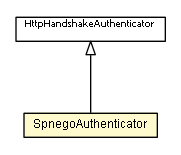lumis.portal.authentication.http
Class SpnegoAuthenticator
java.lang.Object
 lumis.portal.authentication.http.HttpHandshakeAuthenticator
lumis.portal.authentication.http.HttpHandshakeAuthenticator
 lumis.portal.authentication.http.SpnegoAuthenticator
lumis.portal.authentication.http.SpnegoAuthenticator
- All Implemented Interfaces:
- IHttpAuthenticator
public class SpnegoAuthenticator
- extends HttpHandshakeAuthenticator
HTTP authenticator implementation that uses SPNEGO/Kerberos for
authenticating the user accessing the portal.
- Since:
- 7.0.0
| Methods inherited from class java.lang.Object |
clone, equals, finalize, getClass, hashCode, notify, notifyAll, toString, wait, wait, wait |
SpnegoAuthenticator
public SpnegoAuthenticator()
requestAuthentication
protected void requestAuthentication(HttpServletRequest request,
HttpServletResponse response)
throws PortalException
- Description copied from class:
HttpHandshakeAuthenticator
- Request authentication from the browser. The response must be set as
necessary so the browser will respond with the necessary authentication
information in its next request.
This method is called by HttpHandshakeAuthenticator.authenticate(HttpServletRequest, HttpServletResponse)
when an authentication is necessary but it is not in the
HttpHandshakeAuthenticator.STATE_REQUESTED state. So this method implements the 'beginning'
of the authentication.
- Specified by:
requestAuthentication in class HttpHandshakeAuthenticator
- Parameters:
request - the http request.response - the http response.
- Throws:
PortalException
doAuthentication
protected String doAuthentication(HttpServletRequest request,
HttpServletResponse response)
throws PortalException,
ContinueOnNextRequestException
- Description copied from class:
HttpHandshakeAuthenticator
- Perform the user authentication for the given request.
This method is called by HttpHandshakeAuthenticator.authenticate(HttpServletRequest, HttpServletResponse)
when the current state is HttpHandshakeAuthenticator.STATE_REQUESTED. So this method
implements the 'continuation' of the authentication,
after it already began.
- Specified by:
doAuthentication in class HttpHandshakeAuthenticator
- Parameters:
request - the http request.response - the http response.
- Returns:
- the userId of the authenticated user, or null if the
authentication failed.
- Throws:
PortalException
ContinueOnNextRequestException - if the authentication is not
complete and will continue on next request. This is useful when more
requests are necessary to complete the authentication.
getLoginModuleName
protected String getLoginModuleName()
- Returns the login module name to use for SPNEGO authentication.
- Returns:
- the login module name.
- Since:
- 7.0.0
Lumisportal 7.0.0.121130 - Copyright © 2006–2012 Lumis EIP Tecnologia da Informação LTDA. All Rights Reserved.


lumis.portal.authentication.http.HttpHandshakeAuthenticator
lumis.portal.authentication.http.SpnegoAuthenticator